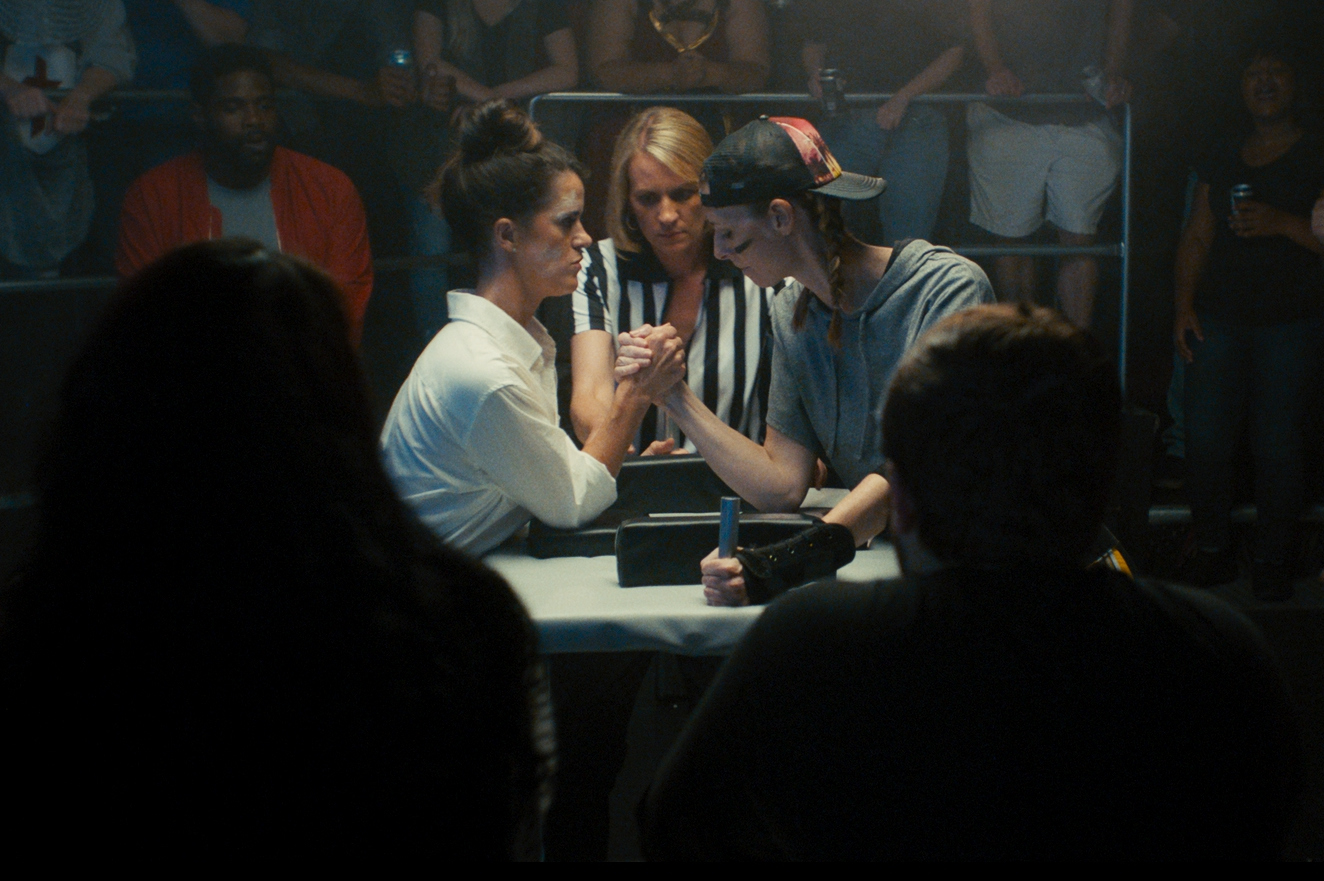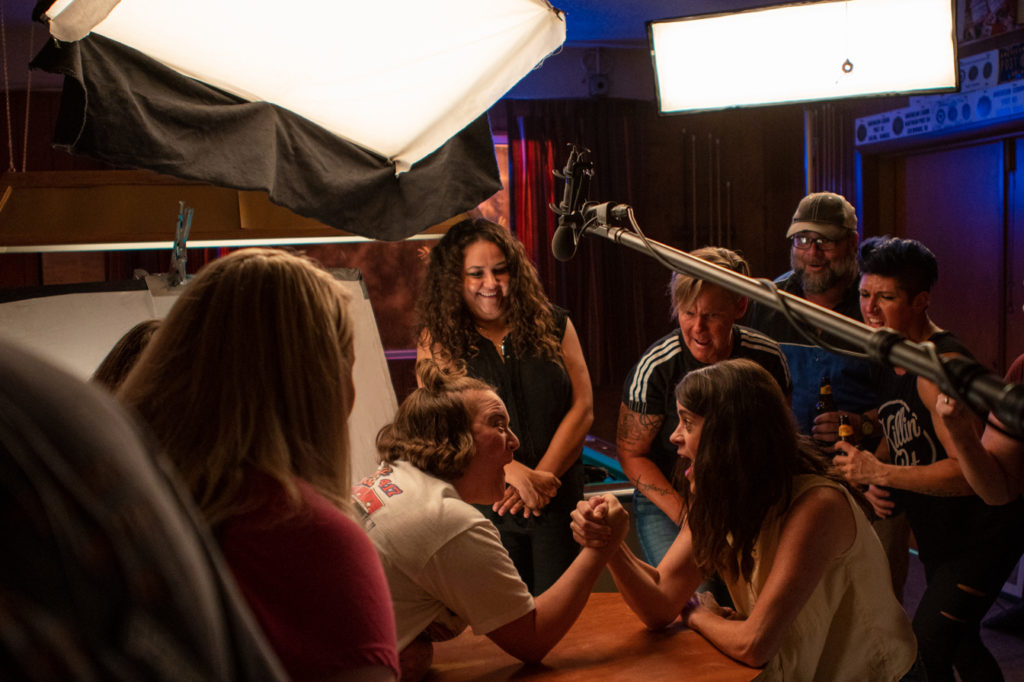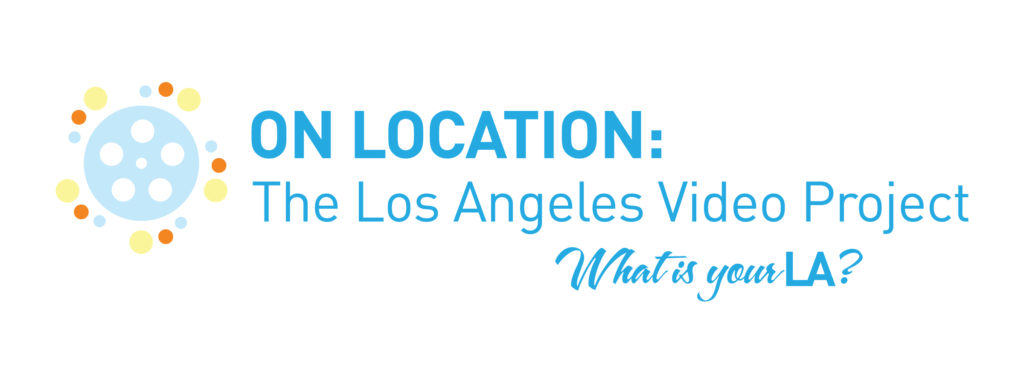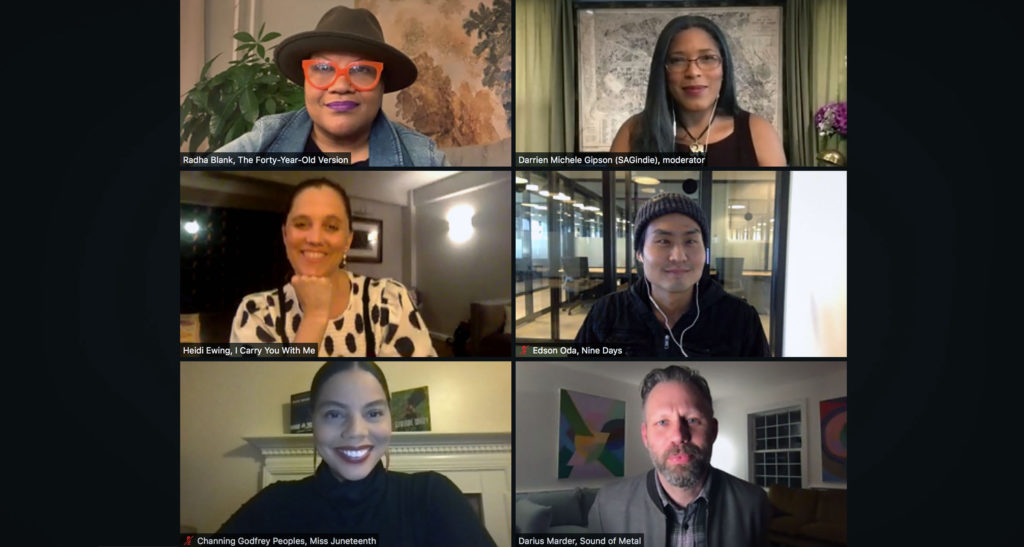Director MAUREEN BHAROOCHA spent three years as a segment director for Jimmy Kimmel Live, which – along with her shorts and sketches – might indicate a penchant for the comedy genre. But Bharoocha has avoided being pigeonholed, directing dramatic shorts, branded content, two Lifetime thrillers (Fatal Flip in 2015 and I Am Watching You in 2016), children’s television, and an upcoming narrative podcast. Her most recent output brought her back to comedy (with a little bit of the sports genre mixed in for good measure), the indie feature GOLDEN ARM.
Golden Arm follows a struggling baker (Mary Holland) as she’s roped into joining an intense arm-wrestling tournament by her best friend (Betsy Sodaro), where she faces off against a formidable foe (Olivia Stambouliah) and catches the eye of a charming referee (Eugene Cordero). With a script by Ann Marie Allison and Jenna Milly, the film features supporting appearances from a vast array of comedic actors, including Kate Flannery, Ron Funches, Aparna Nancherla, Dawn Luebbe, Ahmed Bharoocha, and Dot-Marie Jones.
Originally selected for SXSW 2020, Utopia Distribution will unleash Golden Arm in theaters and digital platforms on April 30. We spoke with Maureen Bharoocha about her directing career, how to direct improv performances, moving into narrative podcasts, and more.
——
COLIN McCORMACK: How did you first get attached to the project?
MAUREEN BHAROOCHA: You know, every movie has its long journey and I got attached to this movie five years ago. The writers, Ann Marie Allison and Jenna Milly, had seen some of my previous shorts and other projects and asked me to do a sizzle based on their [script]. So I basically shot a short sizzle for them in a garage with smoke and mirrors and they took that proof-of-concept and went out to get investors. So I got attached like five years ago. Then when they got the money, they came back and were like, “Okay, we’re ready to do it.” We made it in the summer of 2019 in Oklahoma.
CM: Wow, so was that a new experience – something coming to you that has financing?
MB: [Laughs] I was lucky. I worked on some statements for their [pitch] deck, I went with them to Sundance and did some of the fundraising meet-and-greet kind of things, but I didn’t have to do much of the heavy-lifting on the money there. Jenna and Ann Marie did so much of that work. It was kind of nice to be like, “Okay sure, come back when it’s ready!” And then they did.
CM: The sizzle you put together, was that something you shot entirely new scenes for or were you putting in montages from existing films to [convey] the mood?
MB: No, I got together a bunch of actors – Betsy was in the original sizzle – and I was like, We need a garage and a group of six women; let’s shoot it like Fight Club; let’s get a smoke machine and a single bare bulb. And we shot this one arm-wrestling match. What we all joked about was the opening of the movie now is kind of that original thing I shot; when we were on set, we were like, It’s like the sizzle but on steroids! Now we have a real bar and lots of extras and real cameras! But it was originally a thing we shot in a garage with a bunch of women that I knew.
CM: You mention Fight Club, but were there other films – especially with the visual approach – that were influential?
MB: I’m such a movie buff and I love movies so much, so one of the important things to me was while it’s a comedy, it still feels cinematic. There were many movies I would pull from as far as comedies go. Wayne’s World is one of my all-time favorite movies. And also Black Sheep and Tommy Boy and road trip movies like that for where Mary and Betsy’s characters are concerned. But of course, we were nodding to Over the Top, Fight Club, and even Pee-wee’s Big Adventure. There were so many moments where we were like, “This is like this scene!” “This is like the scene in this!” So many road trip movies. But it was definitely about making sure the movie felt cinematic and not “shot like a comedy.”
CM: Is your on-set experience much different when you’re directing a comedy versus a thriller or a segment? Does your style change depending on the genre?
MB: With the thrillers that I did, we had less time and there was less room for improvising. With comedies, you want to make sure you get what you want and leave room for the magic to happen. We definitely improvised a lot in this movie. Sometimes that was before we’d even get to a scene; we’d talk out what else we could do or how we could punch up a joke. Especially in a feature, you have a little bit more time than when you’re doing a sketch for Kimmel. But you always have to leave a little bit of room to do the dance a little longer, to find stuff that you maybe didn’t see before.
CM: I don’t think I’ve ever talked to a segment director before. How did that shape your directing approach? Is it more akin to directing shorts or commercials?
MB: I think it’s a combo. Working at Kimmel, you’re doing everything. You’re doing commercials, you’re doing man-on-the-streets, you’re doing parodies, you’re doing music videos. You’re kind of doing a little bit of everything. I think directing on Jimmy Kimmel Live as a segment director is the best gig in town. It really sharpens your tools in the sense that you only have a limited amount of time on that show to work. So you learn what you really need to make the edit work, you have to make sure you get a variety of [shots], you punch up the jokes in the moment. It really taught me to think with my gut and not over-think things. When you’re shooting on a show like that you’re moving so fast that you have to trust your instincts and you can’t get in your head too much.
CM: You mentioned Betsy was in the sizzle you shot. For the rest of your cast, was it a traditional casting process or were you bringing on a lot of people you had a previous relationship with?
MB: It was a little mix of both. Mary Holland I’d had a long relationship with, we’ve worked together before on a few projects and I’m such a huge fan of Mary. So she was somebody that I knew. The same thing with Ron Funches, he worked on one of my shorts. And my brother [Ahmed] is in it, I worked with his sketch group Dead Kevin a lot. But then Olivia Stambouliah, she sent in a tape and her tape just blew us away. Like, “We found our Brenda!” She was so great. The same with Dawn Luebbe, she sent in a tape. What’s great about Dawn is we have so many friends in common and based on her tape, I pivoted her character. In her audition, she wore this skater [look] with a backwards hat and elbow pads. I was like, “Oh my gosh, Tessie has to be like this character.” So [casting] was a mix of both but for the most part, it was bringing my tribe of people together – some of my favorite comedians – into one place.
CM: Were you looking for people with improv experience? Going into it, did you know you wanted that to be a part of the process?
MB: For sure. Especially with Mary and Betsy at the helm, they’re incredible improvisers. They’ve actually been improvising with each other for ten years. Knowing that that’s the foundation, you definitely wanted to have people who could come and play and go toe-to-toe. You have a certain level of experience that you want, especially in this movie, and everybody brought it. Everybody was able to add to their character or pitch ideas. It was easy for me to say yes when you have such a wealth of talent and a wealth of comedic minds coming together on one project.
CM: When it comes to post-production when you’ve shot a project with a lot of improv, is there a way you plan in advance for that? Or you just have to roll up your sleeves when you get there and really dig through every take?
MB: My improv style is not so much to just let it go free rein. I think it’s to really be more calculated while you’re in the scenes to know what you want while you’re shooting. To me, improvising helps with finding truth and finding little nuggets, so when you uncover them on set you want to lean in there. So it wasn’t as if we were sifting through so much material, it’s that we might have a joke that was scripted but we would improvise a different joke or pivot, and then on-set I would know which things were going to work. It wasn’t so much in the edit as it was on set. Also, it’s giving the actors parameters when they are improvising and not just letting them go and lead it out of our path.
CM: You filmed the entire thing in Oklahoma?
MB: Yeah, we shot on location in Oklahoma.
CM: What brought you to that location?
MB: We went for the tax incentives. Also, Oklahoma had such a unique vibe. Oklahoma City is such a great city, it has so many different looks and the people were great. Actually, I had never been but we scouted a few cities across the country and that place really popped for some reason. It was just unique and different and not overly shot.
CM: Also, it seems like their film office is a pretty robust organization. Was the local filmmaking community a good resource?
MB: Yeah. I brought some of my key players to Oklahoma, but we found incredible talent there. Our costume designers Jack [O’Dell] and Jenava [Burguiere] were incredible and the movie is what it is because of their talent. Same thing with hair and makeup, Toni [Marlo] and Alex [Ford] were great; our set dec Bezhan [Nazari], so many great people were there. There were actually like six things shooting while we were there so sometimes it was tough to find people because there were so many things shooting. But we definitely found a great, loyal crew who were such hard workers. It was refreshing.
CM: What was your filming schedule?
MB: We shot for 20 days, which was pretty tight but I feel like whenever you shoot anything you wish you had just one more day [laughs].
CM: Did you have any time for rehearsals in advance or was it just running it through when people got on set?
MB: Yeah, we wouldn’t necessarily do rehearsals. What I like to do is check in with the actors in the morning while they’re in their trailers. [I’d] go in and talk about the scene, talk about what it means. If anything is confusing we can talk that out. We can pivot if something’s not working in the script. It was more going in and having discussions every morning about what the scene is going to be about and how it’s going to play out. So it wasn’t so much rehearsal as it was a meeting of the minds, a mind-melding of what exactly we were doing in the scene and how we could change it if it was confusing or bumping for the actors.

CM: In terms of changing things and working on the fly, was there a day or a scene that proved to be a particular challenge or something you had to shift last minute?
MB: Yeah, there were many [laughs]. There were actually three days in particular. We had one scene – when Kate Flannery was there – we were supposed to shoot this whole scene outside; Mary and Betsy’s characters leave the bar and they have this whole scene outside. Then what happened was there was a thunderstorm. In Oklahoma, of course. So we had to pivot. We weren’t going to be able to be outside so we were like, What are we going to do? We only had so much more time with [Kate], so we ended up deciding to shoot the whole scene in a men’s bathroom. It ended up being a lot funnier because it was more of a time crunch, it was weird, they rush in. So in a way, I think it made the scene funnier. Stuff like that was kind of fun. It’s exciting when you find something new and you find a different perspective. You think, Oh no, the thunderstorm’s going to ruin our shoot. But we stayed inside and we shot the scene.
CM: You were slated to premiere at SXSW in 2020, but obviously that was the festival that was canceled because of COVID. What was that recalibration process like for you?
MB: Obviously, 2020 was such a unique experience for everybody. In the beginning, I was worried. Like, What’s going to happen? We don’t know. Kind of the unknown and the wild, wild west. And as the year went on, I was just more confident that it was going to find a home because it’s such a fun movie, and coming out of the pandemic, it’s exactly the kind of movie that people are going to want to see. So I did some press; I did some op-eds; me, Mary, and Betsy wrote a new script together during the pandemic. Now that we’re coming out of it, I’m so excited that this is the way we get to celebrate coming back into the world. In a way, it kind of worked out better than I had even hoped.
CM: So you didn’t have a distribution deal going into the festival, but it sounds like the lack of a big splashy premiere didn’t hurt you guys from still finding the right [distributor]?
MB: Yeah, we found Utopia, which is such an awesome company. They’re so female filmmaker-driven. It’s really great to be in a place that gets it and celebrates the artistry and the creativity. I’m so glad that Utopia is our distributor.
CM: I love a good movie poster and I really like yours.
MB: Yes! Oh my gosh, thank you. That was my brainchild. I just love all the sports movies, Star Wars, all those ’70s posters. So I was like, We need an epic poster to go with our epic movie. Austin Page was the one who did that poster, he’s such a great artist.
CM: How has it been getting ready to release a film when we’re in that half-theatrical, half-VOD [space]. Are you staying put and doing all of your promotions remotely anyway?
MB: I’m doing all of my promotions remotely, but I’m definitely going to sneak into the theater and watch it. Because it’s such a movie to watch on the big screen, it’s such a communal type of movie that I definitely want to have that experience. So I’ll be wearing my hazmat suit, masks, and shields and fighting my way out there. But one thing I hope that people really love is I hope it’s a cult classic, that it’s the kind of movie you want to rewatch. So you might enjoy it in the comfort of your home and then feel like, I want to see it on the big screen and see these fights and action in a communal space. That’s the fun thing is that you can experience it both ways.
CM: Will it be your first time seeing on a big screen with a room of people or were you able to sneak one in prior?
MB: We had a test screening at the Upright Citizens Brigade Sunset Theater before that shut down over the pandemic. It was a rough cut, it wasn’t the polished version. So this will be the first time I get to see it polished with the right sound and the music and all the bells and whistles. That will be really exciting.
CM: You mentioned you’d written a script during lockdown, so what else is next for you?
MB: Yeah, during the pandemic, Mary, Betsy, and I wrote a new feature that we’re taking out. And I just recently directed a couple of episodes of this really cool show on Nickelodeon called Drama Club. I have this really awesome podcast series called Edith coming out, starring Rosamund Pike. That was kind of my first thing back in the real world. And then just continuing to write and direct on television.
CM: So you were directing the podcast? Or writing, producing, all of the above?
MB: I actually directed it for these really incredible writers, Gonzalo Cordova and Travis Helwig. It comes out of Crooked Media and QCODE. They wrote this incredible script, eight episodes, with Rosamund Pike who plays the main character, Edith. That was an incredible experience and I can’t wait for people to hear that as well.
CM: I have to ask since this is the first podcast director I’ve interviewed, what’s your experience and advice on directing a narrative podcast?
MB: I think it’s harder [laughs]. It’s harder in a sense of you have to know all the characters inside and out. I directed pretty much everybody individually over Zoom. With a regular thing you’re shooting, you wrap a scene, great. But [in a podcast] when you have four characters in a scene, you might return to [direct] that scene four more times with each character. So while it was very rewarding, it was really challenging. It was a really interesting way too to deal with actors because each actor’s style was so different. When you’re working one-on-one with actors, you really get a better sense of what they need and how to help them in the scenes.
CM: It sounds like you really continue to challenge yourself with new formats and genres, so good luck and congrats on everything!
MB: Thanks so much!
__
Thanks again to Maureen for chatting with us about GOLDEN ARM. Follow the film on Twitter, Instagram, or Facebook.
If you’re an independent filmmaker or know of an independent film-related topic we should write about, email blogadmin@sagindie.org for consideration.




